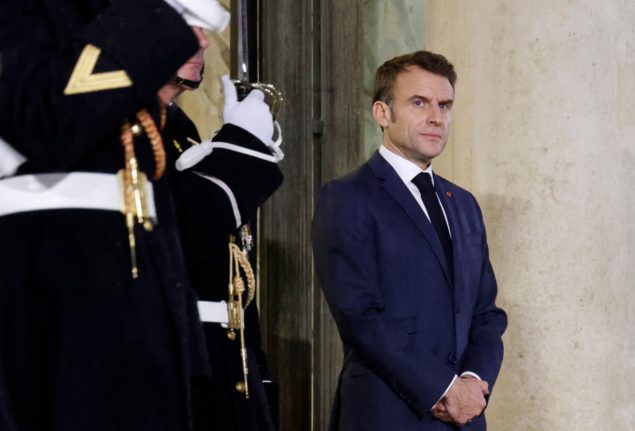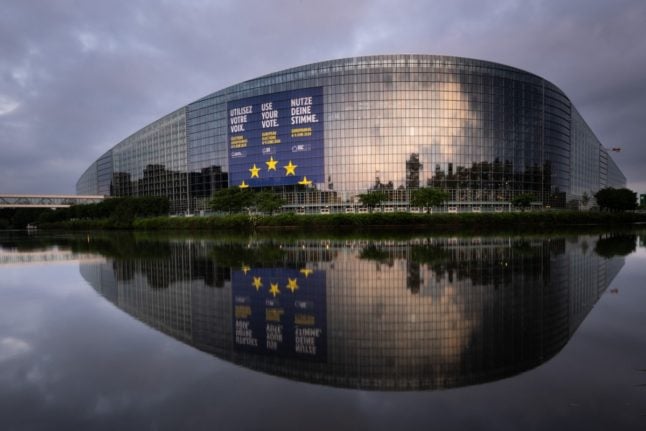His political opponents have accused him of breaking the country’s strict secularism laws, with one saying the candle ceremony was the equivalent of “playing with nitroglycerine and matches”.
On Thursday, the beginning of the Jewish festival of Hanukkah, France’s Chief Rabbi Haïm Korsia was invited to the Elysée to light a candle to mark the day. The ceremony was part of an awards event at which Macron was handed a prize for his stance against anti-Semitism.
A brief video clip of this ceremony, showing the Rabbi lighting the candle as Macron looks on and smiles, was later published on social media by one of the event attendees – and has stirred huge political controversy, with the president accused of undermining the country’s strict laws on secularism (laïcité).
Historique !
Allumage de la 1ere bougie de #Hanouka au Palais de @Elysee par le Grand Rabbin de France @HaimKorsia avec @EmmanuelMacron
La petite lumière chasse beaucoup d’obscurité !@PinchasRabbi @ElieKorchia pic.twitter.com/or58WGDhKY— Mendel Samama (@EURORabbi) December 7, 2023
Macron’s supporters, however, insist that it is simply a ceremonial gesture, and intended to show support to the Jewish community in France at a time of rising anti-Semitism.
So why the controversy?
France’s laws on state secularism, passed in 1905, give everyone in France the freedom to worship as they wish, but say that the religion should play no part in the running of the state.
The secularism requirement extends to all State bodies – from government ministries to local mairies and state-run schools – it’s for this reason that schools do not put on Nativity plays and mairies do not have Christmas cribs.
The rule also requires State employees to be secular during their working hours, so for example public servants like police officers, teachers or préfecture staff cannot wear any sign of their religion (eg kippah or Muslim headscarf) while at work.
Explained: What does laïcité really mean in France?
The Elysée Palace is both the home and the workplace of the president during their term of office, so all French presidents are entitled to worship how they chose while in residence.
The controversy, however, is around whether the candle ceremony implies the State endorsement of any particular religion.
Who says what?
Yonathan Arfi, president of the Jewish Council in France, described the ceremony as “a mistake”. He told Sud Radio: “It is not the place of the Élysée to light a Hanukkah candle, because the Republican DNA is to stay away from anything religious. This is not traditionally the role of the public authorities.”
Parti Socialiste politician Jérôme Guedj said: “As nice as it is, Hanukkah is a religious holiday. In which no elected official of the Republic should participate, like any religious display.”
Meanwhile Carole Delga, president of the southern region of Occitaine, said: “You don’t compromise with secularism. This common ground is precious but fragile.”
Parti Socialiste senator Laurence Rossignol went for a more dramatic image, saying: “President Macron is like a 10-year-old with a little chemist’s kit, but with real nitroglycerine and real matches.”
But some see the event as simply showing solidarity with the Jewish community, regarded as especially important this year since anti-Semitic acts have risen sharply since the October 7th Hamas attacks and Israel’s subsequent bombardment of Gaza.
Prime minister Elisabeth Borne, defending Macron, said: “We are in a period of rising anti-Semitism that we cannot allow to pass. There are different ways of sending messages (of support) to the Jewish community. She added that the candle ceremony as “a signal”.
Interior Minister Gérald Darmanin said: “Secularism is not the negation of religions. We have to ensure that all religions can live together. I have always believed that religions can express their beliefs as long as they do not interfere with those of others and as long as they do not become a political ideology.”
Darmanin has previously seemed more uncompromising on secularism – such as the time in 2020 when he said he was “shocked” to see ethnic food aisles in supermarkets.
What does Macron say?
Asked about the criticism during a visit to the Notre-Dame cathedral Friday, Macron said he had no regrets “at all” and had allowed the celebration “in the spirit of the republic and of harmony”.
He had not himself participated in any religious ritual or ceremony that, he acknowledged, would have been “disrespectful of secularism”.
But “that’s not what happened”, he said.
Can politicians celebrate religious festivals?
It is absolutely OK for politicians to celebrate religious festivals such as Christmas or Hannukkah as private individuals.
It’s also common for ministers to publish festive greetings to their constituents – here’s Gérald Darmanin wishing “a very happy Hannukkah to all the Jews in France”.
Je souhaite une très belle fête de #Hanouka à tous les Juifs de France.
— Gérald DARMANIN (@GDarmanin) December 7, 2023
It’s also quite common to see politicians partake in the more secular aspects of Christmas such as wearing festive jumpers or decorating a Christmas tree – many local mayors give out hampers to their elderly constituents at Christmas time.
However, Macron was criticised for attending a Mass hosted by Pope Francis on his visit to Marseille in September.



 Please whitelist us to continue reading.
Please whitelist us to continue reading.
The Marie in my town has a long tradition of putting a Christmas nativity scene inside the building. So much for secularism.